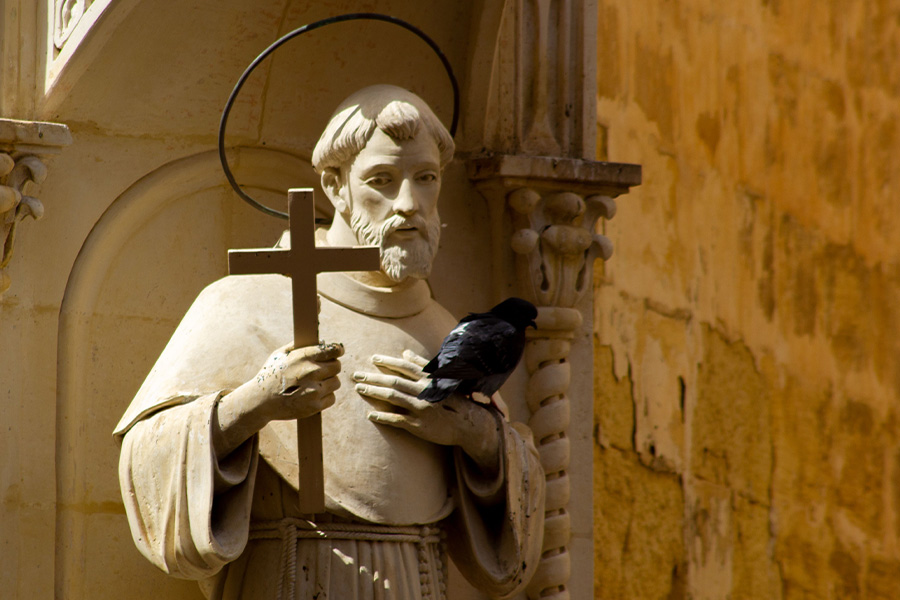Corpus Christi Blog

Lent with St. Francis — Part 2: Humility and Obedience
02-25-2024Weekly ReflectionJen Arnold, M.A. in Theology and CatecheticsLast week, I discussed how St. Francis lived an austere life by seeking ways to practice self-control and detachment from physical and worldly comforts. This week, as we continue our Lenten journey with St. Francis according to St. Bonaventure, we will examine two more virtues in which the great saint excelled.
Chapter Six: Of His Humility and Obedience, and How the Divine Majesty Granted All His Prayers
The Catholic Encyclopedia defines humility as: “A quality by which a person considering his own defects has a lowly opinion of himself and willingly submits himself to God and to others for God's sake.” Modern culture argues against having a low opinion of oneself. It encourages building one's self-esteem by recognizing one's self-worth and accepting the praise that goes with a job well done in whatever situation it occurs. This position lacks the Christian understanding that humility requires extreme self-awareness, recognizing our sinfulness, and, therefore, unworthiness before God. Jesus promises a reward for authentic humility, saying, “For everyone who exalts himself will be humbled, and he who humbles himself will be exalted” (Lk 14:11). So, humility is something for which we must strive because it is required for entrance into the kingdom of heaven.
READ MORE
Lent with St. Francis, Part 1: Austerity
02-18-2024Weekly ReflectionJen Arnold, M.A. in Theology and CatecheticsOnce again, we find ourselves in the liturgical season of Lent. This is a time to focus on our growth in holiness and virtue through prayer, penance, and almsgiving as we anticipate the suffering Jesus endured to reconcile us to the Father. As the inspiration for this year's Lenten reflection series, I am using The Life of St. Francis of Assisi, by St. Bonaventure.
St. Francis (1181-1226) was a wealthy businessman who, by his own admission, led a sinful life and desired earthly glory above all else. His conversion was slow and occurred through a series of events, but eventually, he fully accepted God’s will for his life. He embraced poverty, became an excellent preacher, was ordained a deacon, and founded the Franciscan order – none of which he originally set out to do.
READ MORE
Spousal Love
02-11-2024Weekly ReflectionJen Arnold, M.A. in Theology and CatecheticsSt. Valentine's Day is this week, and while it may be fun to celebrate with hearts, gifts, and romantic dinners, it is also an excellent time to reflect on Christian love in the context of marriage.
The Sacrament of Marriage is a beautiful gift from God intended to provide us lifelong companionship and access to the grace that flows from the sacramental bond. However, marriage also comes with a considerable amount of responsibility. St. Paul says, “Husbands, love your wives as Christ loves the church…” (Eph 5:25). Paul speaks directly to husbands here because it is embedded in a larger context that emphasizes the differences between men and women. Still, the call for spouses to love one another is universal.
READ MORE
Natural Law
02-04-2024Weekly ReflectionJen Arnold, M.A. in Theology and CatecheticsWe live in a world plagued by moral relativism, where even the word “morality” can be controversial. As Catholics, we are blessed to have guides in the Magisterium and Scripture for properly forming our consciences, knowing right from wrong, and living a moral life, along with gentle and loving remedies for when we get off track. However, the world at large rarely adheres to the Church’s guidance on moral issues, claiming we follow arbitrary rules imposed by a distant, non-existent, or irrelevant God. Likewise, often Church and biblical teaching is considered antiquated and even unapplicable to an ever-evolving society and set of circumstances. Hence, we see growing confusion and disagreement over right and wrong.
READ MORE